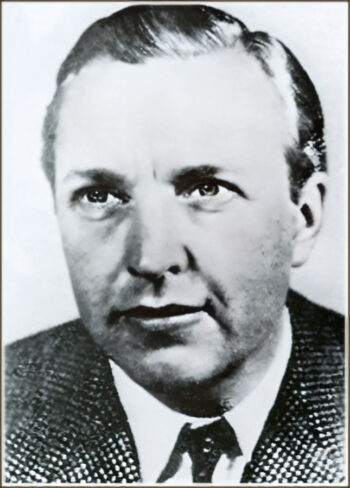Becher, Kurt

Kurt Becher (12 Sept. 1909 – 8 Aug. 1995), SS Obersturmbannführer, was a member of the SS leadership office in very early 1944, from which he was assigned to procure horses and strategic goods in Hungary. In this connection, he was part of the famous negotiations between Himmler and Zionist organizations to exchange Jews for strategic goods (cf. Bauer 1994, starting on p. 220). For his involvement in the deportation of the Jews from Hungary, Becher was arrested by the Allies after the war and repeatedly interrogated. Due to his readiness to cooperate, he finally succeeded in being transferred to the “open wing” at Nuremberg instead of being treated like a possible defendant as before. As a reward for his cooperation, Becher was never charged with anything.
As is well known, there is no document ordering any extermination of the Jews (see the entry on the Hitler Order). But it is claimed that a document did exist which supposedly ordered an end to the extermination. In this way, the orthodoxy tries to circumvent the embarrassing lack of evidence that there was any order to systematically kill the Jews. However, no document ordering the end of exterminations has ever been produced either. Instead, as alleged proof of its existence, the Allies coerced Kurt Becher to write an affidavit and testify before the Nuremberg International Military Tribunal that he had obtained a Himmler order meant for Ernst Kaltenbrunner and Oswald Pohl “sometime between mid-September and mid-October 1944.” With this order, Himmler is said to have prohibited “any extermination of the Jews, effective immediately” (IMT Document 3762-PS; IMT, Vol. 33, pp. 68f.). Becher repeated this claim in an affidavit deposited for the Eichmann Trial.
The true background of this coerced affidavit was revealed only in 1997, when Göran Holming, a major of the Swedish army who had befriended Kurt Becher, reported what Becher had told him in the 1970s. According to this, Becher stated that Himmler’s order actually decreed that the German concentration camps should be surrendered in an orderly manner upon the approach of the enemy, without casualties. It had nothing to do with any “extermination” at all. Asked why he had lied in his affidavit, Becher replied that outsiders could not possibly understand the circumstances in Nuremberg at that time (Holming 2023; Rudolf 2023, pp. 398f.). This grand lie saved Becher his life and liberty.

You need to be a registered user, logged into your account, and your comment must comply with our Acceptable Use Policy, for your comment to get published. (Click here to log in or register.)